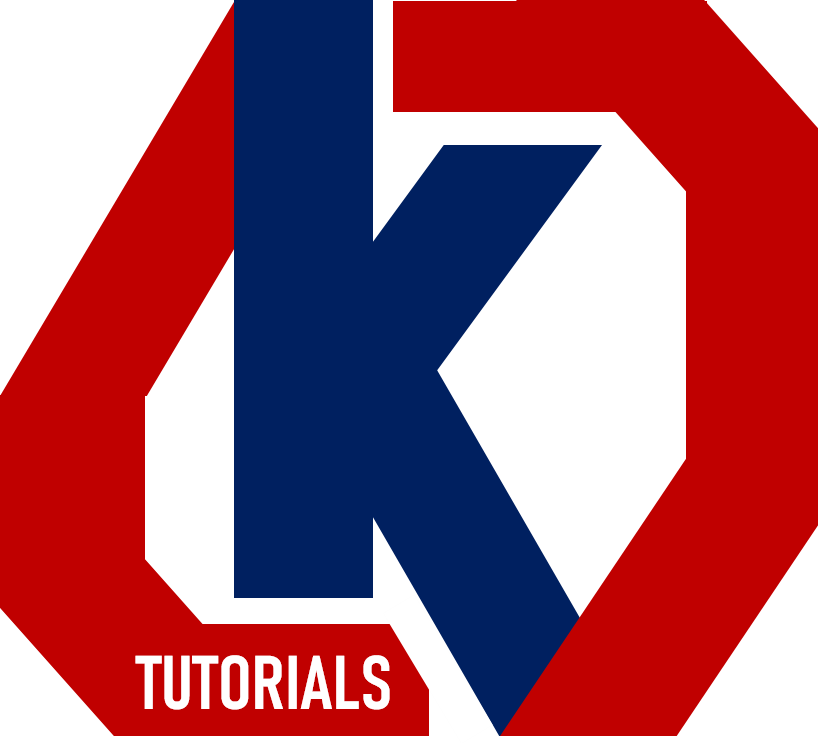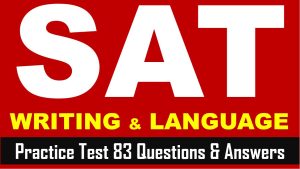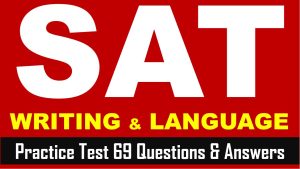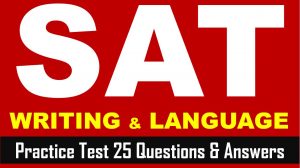Hi SAT Aspirants, welcome to AKVTutorials. As you know SAT (Scholastic Assessment Test) is a standard test, used for taking admission to undergraduate programs of universities or colleges of United States. SAT is developed and published by the College Board, an organization in United States, administered by the Educational Testing Service. Therefore, you need to do practice on SAT Reading Section, SAT Writing and Language Section. In this article, you will get FREE SAT Writing Practice Test 90 with Answer Keys AMBIPi.
Instruction:
- In the passage below is accompanied by a number of questions.
- For some questions, you need to think how the passage might be revised to improve the expression of ideas.
- For other questions, you will consider how the passage might be edited to correct errors in sentence structure, usage, or punctuation.
- Some questions will direct you to an underlined portion of a passage.
- Other questions will direct you to a location in a passage or ask you to think about the passage as a whole.
SAT Writing & Language Section Passage
FREE SAT Writing Practice Test Passage Title: Dong Kingman: Painter of Cities
A 1954 documentary about renowned watercolor painter Dong York City’s Chinatown. A crowd of admiring spectators 1 watched as Kingman squeezes dollops of paint from several tubes into a tin watercolor 2 box, from just a few primary colors, Kingman creates dozens of beautiful hues as he layers the translucent paint onto the paper on his easel. Each stroke of the brush and dab of the sponge transforms thinly sketched outlines into buildings, shop signs, and streetlamps. The street scene Kingman begins composing in this short film is very much in keeping with the urban landscapes for which he is best known.
[1] Kingman was keenly interested in landscape painting from an early age. [2] In Hong Kong, where Kingman completed his schooling, teachers at that time customarily assigned students a formal “school name.” [3] His interest was so keen, in fact, that he was named after it. [4] The young boy who had been Dong Moy Shu became Dong Kingman. [5] The name Kingman was selected for its two 3 parts, “king” and “man”; Cantonese for “scenery” and “composition.” [6] As Kingman developed as a painter, his works were often compared to 4 paintings by Chinese landscape artists dating back to CE 960, a time when a strong tradition of landscape painting emerged in Chinese art. [7] Kingman, however, 5 vacated d from that tradition in a number of ways, most notably in that he chose to focus not on natural landscapes, such as mountains and rivers, but on cities. 6
7 His fine brushwork conveys detailed street-level activity: a peanut vendor pushing his cart on the sidewalk, a pigeon pecking for crumbs around a fire 8 hydrant, an old man tending to a baby outside a doorway. His broader brush strokes and sponge-painted shapes create majestic city skylines, with skyscrapers towering in the background, bridges connecting neighborhoods on either side of a river, and 9 delicately painted creatures, such as a tiny, barely visible cat prowling in the bushes of a park. To art critics and fans alike, these city scenes represent the innovative spirit of twentieth-century urban Modernism.
During his career, Kingman exhibited his work 10 internationally. He garnered much acclaim. In 1936, a critic described one of Kingman’s solo exhibits as “twenty of the freshest, most satisfying watercolors that have been seen hereabouts in many a day.” 11
FREE SAT Writing Practice Test Practice Questions
Question No 1
Which choice best maintains the sentence pattern already established in the paragraph?
Option A : No Change
Option B : had watched
Option C : would watch
Option D : watches
Answer
Show/Hide Answer
Option D : watches B
because Choice D is the best answer because the simple present tense verb “watches” is consistent with the tense of the verbs in the rest of the sentence and paragraph.
Question No 2
Which of the following options is the most effective?
Option A : No Change
Option B : box. From just a few primary colors,
Option C : from just a few primary colors,
Option D : box, from just a few primary colors
Answer
Show/Hide Answer
Option B : box. From just a few primary colors,
because B is the best answer because it provides punctuation that creates two grammatically complete and standard sentences.
Question No 3
Which choice provides the most effectively transition to the information that follows?
Option A : No Change
Option B : parts: “king” and “man,
Option C : parts “king” and “man”;
Option D : parts; “king” and “man”
Answer
Show/Hide Answer
Option B : parts: “king” and “man,
because B is the best answer because the colon after “parts” effectively signals that what follows in the sentence further defines what the “two parts” of Kingman’s name are and because the comma after “man” properly indicates that “‘king’ and ‘man’” and “Cantonese for ‘scenery’ and ‘composition’ ” are nonrestrictive appositives
Question No 4
Which choice results in the most effective transition to the information that follows in the paragraph?
Option A : No Change
Option B : Chinese landscape artists
Option C : painters of Chinese landscapes
Option D : artists
Answer
Show/Hide Answer
Option A : No Change
because A is the best answer because it creates a comparison between like terms: “works” by Kingman and “paintings by Chinese landscape artists.”
Question No 5
Which choice best maintains the sentence pattern already established in the paragraph?
Option A : No Change
Option B : evacuated
Option C : departed
Option D : retired
Answer
Show/Hide Answer
Option C : departed
because C is the best answer because “departed” is the most contextually appropriate way to indicate that Kingman had deviated from the tradition of Chinese landscape painting in a number of ways.
Question No 6
To make this paragraph most logical, sentence 3 should be placed
Option A : No Change
Option B : before sentence 1.
Option C : after sentence 1.
Option D : after sentence 4.
Answer
Show/Hide Answer
Option D : c
because C is the best answer because placing sentence 3 after sentence 1 makes the paragraph most cohesive. Sentence 3 refers to Kingman’s “interest” being “so keen,” a continuation of the idea in sentence 1, which says that “Kingman was keenly interested in landscape painting from an early age.”
Question No 7
Which choice most effectively establishes the main topic of the paragraph?
Option A : Kingman is considered a pioneer of the California Style school of painting
Option B : Although cities were his main subject, Kingman did occasionally paint natural landscapes.
Option C : In his urban landscapes, Kingman captures the vibrancy of crowded cities.
Option D : In 1929 Kingman moved to Oakland, California, where he attended the Fox Art School.
Answer
Show/Hide Answer
Option C : In his urban landscapes, Kingman captures the vibrancy of crowded cities.
Because C is the best answer because it clearly establishes the main topic of the paragraph: Kingman’s urban landscapes.
Question No 8
Which choice most effectively establishes the main topic of the paragraph?
Option A : NO CHANGE
Option B : hydrant—
Option C : hydrant:
Option D : hydrant
Answer
Show/Hide Answer
Option A : NO CHANGE
Because e A is the best answer because a comma after the word “hydrant” separates the phrase “a pigeon pecking for crumbs around a fire hydrant” from the phrase “an old man tending to a baby outside a doorway.”
Question No 9
The writer wants to complete the sentence with a third example of a detail Kingman uses to create his majestic city skylines. Which choice best accomplishes this goal?
Option A : No Change
Option B : exquisitely lettered street and storefront signs.
Option C : other details that help define Kingman’s urban landscapes.
Option D : enormous ships docking at busy urban ports.
Answer
Show/Hide Answer
Option D : enormous ships docking at busy urban ports.
because D is the best answer because the phrase “enormous ships docking at busy urban ports” effectively continues the sentence’s series of details (“skyscrapers towering in the background” and “bridges connecting neighborhoods”) conveying the majesty of city skylines as depicted by Kingman
Question No 10
Which choice most effectively combines the sentences at the underlined portion?
Option A : internationally, and Kingman also garnered
Option B : internationally; from exhibiting, he garnered
Option C : internationally; from exhibiting, he garnered
Option D : internationally, garnering
Answer
Show/Hide Answer
Option D : internationally, garnering
because D is the best answer because it combines the sentences logically and efficiently, with the original second sentence becoming a participial phrase describing Kingman.
Question No 11
The writer wants to conclude the passage with a sentence that emphasizes an enduring legacy of Kingman’s work. Which choice would best accomplish this goal?
Option A : Although Kingman’s work might not be as famous as that of some other watercolor painters, such as Georgia O’Keeffe and Edward Hopper, it is well regarded by many people.
Option B : Since Kingman’s death in 2000, museums across the United States and in China have continued to ensure that his now-iconic landscapes remain available for the public to enjoy.
Option C : The urban landscapes depicted in Kingman’s body of work are a testament to aptness of the name chosen for Kingman when he was just a boy.
Option D : Kingman’s work was but one example of a long-lasting tradition refreshed by an innovative artist with a new perspective.
Answer
Show/Hide Answer
Option B : Since Kingman’s death in 2000, museums across the United States and in China have continued to ensure that his now-iconic landscapes remain available for the public to enjoy.
because B is the best answer because it concludes the passage with a sentence that emphasizes the enduring legacy of Kingman’s work by indicating that museums continue to make Kingman’s iconic paintings accessible to the public.



